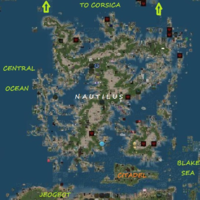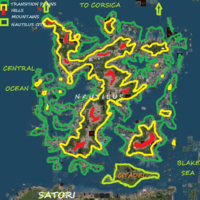Difference between revisions of "Nautilus"
| Line 63: | Line 63: | ||
== Geography == | == Geography == | ||
[[File:Nautilus geography|200px|thumb|right|Nautilus geographic features]] | [[File:Nautilus geography.png|200px|thumb|right|Nautilus geographic features]] | ||
It is difficult to separate the surface features of Nautilus. The ocean floor can be divided into shallw waters and deep waters. The ground can also be divided into coast transition plains, hills and mountains. In many places, the land looks similar to the South-East sims of [[Sansara]]. | It is difficult to separate the surface features of Nautilus. The ocean floor can be divided into shallw waters and deep waters. The ground can also be divided into coast transition plains, hills and mountains. In many places, the land looks similar to the South-East sims of [[Sansara]]. | ||
Revision as of 04:42, 12 September 2013
Nautilus is the second recommended destination for sailing, after Blake Sea. This continent is linked to Corsica at North, with Satori at South and with Blake Sea at South-East, with Transcontinental Channels. Together with Satori, it forms a supercontinent, like Euroasia in real workd.
In South-East, close to the connection with Blake Sea, there is Nautilus City, a city on an island, with an inner citadel, a complex road network and a navigable channel.
The continent has a complex coast line, with many gulfs and peninsulas. The road system is not well developed, with many missing parts. The coast is usually populated, while the mainland sims inside the continent, without access to road and water, are usually abandoned. The seas are usually not deep and the dryland is a plain.
Statistics
Note: It's difficult to make a clear separation between Nautilus and Satori.
Size in sims: 842 (N-S 34, E-W 32)
Size in meters: 55.18 square km (8.70/8.19 km)
Sea sims (only with water): 172
Coast sims (direct access to water): 534
Land sims (no water): 136
Sims with road access: 112
Sims without direct access: 77
Population density: med-low
Note: Population density is high is coast sims, low in land sims and very low in water sims. The water sims are usually protected land, like in any other continent, but their percent is much higher in Nautilus.
Coordinates
The following coordinates are given in sims, with the same principles used by Gridsurvey [1]. The separation between Nautilus and Satori is not clear. Subdivisions of Nautilus Continent are not shown on any map and on no site. So, the subdivisions marked here are deduced directly from map shape. The only clear subcontinent is Nautilus City. The separation line between Nautilus and Blake Sea is more clear. The numbers below are: longitude (min - max) / latitude (min - max).
Continent: 1106-1137/1047-1081
Nautilus City: 1120-1131/1047-1051
Blake Sea Crossing Area: 1123-1034/1147-1053
Satori Sea Crossing Area: 1111-1119/1047-1051
South-East Island: 1125-1131/1052-1060
South Sea: 1120-1124/1052-1060
West Sea: 1106-1119/1057-1070
Star-like Gulf: 1122-1131/1066-1072
North-West Peninsula: 1107-1119/1071-1081
Northern Shores: 1120-1137/1067/1075
East Sea (North Basin): 1132-1136/1066/1072
East Sea (Central Basin): 1126-1134/1061-1065
East Sea (South Basin): 1132-1134/1054-1060
Central Landmass: 1120-1125/1061-1072
South Peninsula: 1109-1119/1052-1056
Geography
It is difficult to separate the surface features of Nautilus. The ocean floor can be divided into shallw waters and deep waters. The ground can also be divided into coast transition plains, hills and mountains. In many places, the land looks similar to the South-East sims of Sansara.
The mountains have an average maximum hight of 120 meters. They are massive but accessible. Usually, they have a whiter texture that makes them visible. The mountains are sometimes similar with the hills, only the color and the altitude are different, but this is not a rule. In some places, the hills are heavilly fragmented, while the mountains are more compact.
The hills cover the largest surface of the continent and almost all the islands. Usually, their texture is green. They are more fragmented, but that not always their form. The fragmentation is usually the result of repeated terraforming. Almost vertical walls can be found on all the continental surface.
Transition plains are easy to find near the seaside. They have a special sand texture. Water enters deep inside these plains. There are many gulfs, channels and estuaries, usually modified by terraforming. The plains not smooth plains. Slopes and small hills are frequent. A special case is Nautilus City, a subcontinent that stands on a large plain with green grass texture. Nautilus City has the same altitude with Bay City in Sansara.
Shallow waters are usually near the coast. They can be easy seen on map whiter then the deep sea. They are easy to terraform.
Deep waters are usually protected land. They are important waterways. The ocean floor has the same texture, sand. On the ocean floor, submerged hills are frequent. They can be a problem for large ships. Also, vegetation is present and sometimes the fish population can be unexpected high.
Transportation
The main way of transportation must be sailing. The vast network of seas, gulfs, estuaries and fjords give easy water access to many parcels. A large oceanic surface is protected land. Even so, every avatar must have its own ship or travel underwater. Automated ships are rare and almost unknown.
Road transport is limited. The road network is composed of two unconnected subnetworks. This is a major problem for the local economy. In some places the population density is similar to places in Heterocera, but to travel, an avatar needs to go through many parcels. This is difficult, since many parcels have an entity orb that will teleport unwanted visitors or have ban lines. Continous buildings and walls resulted from terraforming are also major problems. Continental land of Nautilus needs a larger transportation system.
Links
[2] - Nautilus Ferry Service
Nautilus Network - road network
[3] - Second Life Wikia

